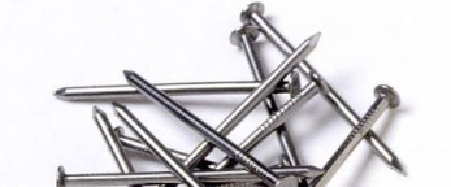Agriculture Reference
In-Depth Information
Assorted Nails
Source:
IronWireNails.com
Warning
:
Accelerated corrosion will occur upon the application of electric current into the soil. Depending
upon the electrode material used, electrolytically-dissociated metal ions can cause soil or plant toxicity
problems over time. For this reason, it is best to use electrodes that are non-toxic, e.g. iron-based
materials with little or no additives. For some applications, corrosion-resistant steels may also be used.
For example, corrosion-resistant stainless steel is a much better material to use compared to copper or
aluminum,whichcanharmtheplantsandyourbody,too.Yet,tobefair,eventhoughsomematerialsare
resistant,theyarenotimmunetocorrosionandwhentheydocorrode,someoftheirminorelementswill
bereleasedintothesoil.Stainlesssteelisoneexampleofthesetypesofmaterials.Ifitdoesdegradeinto
the soil, it's helpful to know that the proportion of non-iron impurities (that may be toxic) is generally
quite low. Another thing to be aware of is how these metals react to the presence of electricity and the
chemicals present within the soil mass. The reason stainless steels may be good in some applications
but not others is because some forms of stainless steel produce reaction products, called oxidation
compounds, that are toxic. This is a complex topic and further research is needed in this area.
One thing you can do to reduce the amount of electrically-induced corrosion is to use the
lowest effective operating voltage that you can. This is because the rate of metal leaching
or dissociation is proportional to the voltage used. The greater the voltage, the greater the
speed of reaction. If the reaction speed is low, it gives time for any potentially harmful
reaction products to become diluted within the soil mass.
It'sworthnotingthatmanydifferentsoils,especiallyinurbanordevelopedareas,orinregionswheremining
may have taken place, already have some of these toxic elements present. The US Environmental Protection
Agency has established guidelines as to what levels of heavy metals and other toxic products are considered
safe (usually in parts per million). The point of mentioning this here is that while some amounts of toxic
release may be okay, it should be avoided. On the other hand, if it cannot be avoided, there are things that
you can do to clean up the soil afterwards, e.g. phytoremediation.
Electrode Sizes


